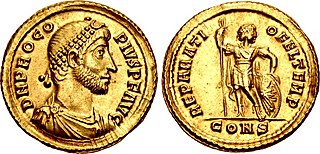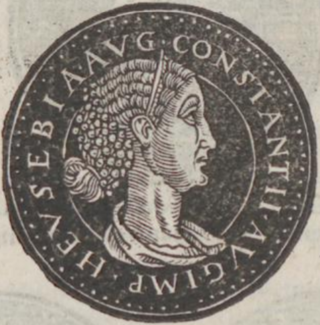Related Research Articles
Ammianus Marcellinus, occasionally anglicised as Ammian, was a Roman soldier and historian who wrote the penultimate major historical account surviving from antiquity. His work, known as the Res gestae, chronicled in Latin the history of Rome from the accession of the Emperor Nerva in 96 to the death of Valens at the Battle of Adrianople in 378, although only the sections covering the period 353 to 378 survive.

Constantius II was Roman emperor from 337 to 361. His reign saw constant warfare on the borders against the Sasanian Empire and Germanic peoples, while internally the Roman Empire went through repeated civil wars, court intrigues, and usurpations. His religious policies inflamed domestic conflicts that would continue after his death.

Julian was the Caesar of the West from 355 to 360 and Roman emperor from 361 to 363, as well as a notable philosopher and author in Greek. His rejection of Christianity, and his promotion of Neoplatonic Hellenism in its place, caused him to be remembered as Julian the Apostate in Christian tradition. He is sometimes referred to as Julian the Philosopher.

Valens was Roman emperor from 364 to 378. Following a largely unremarkable military career, he was named co-emperor by his elder brother Valentinian I, who gave him the eastern half of the Roman Empire to rule. In 378, Valens was defeated and killed at the Battle of Adrianople against the invading Goths, which astonished contemporaries and marked the beginning of barbarian encroachment into Roman territory.

Valentinian I, sometimes called Valentinian the Great, was Roman emperor from 364 to 375. He ruled the Western half of the empire, while his brother Valens ruled the East. During his reign, he fought successfully against the Alamanni, Quadi, and Sarmatians, strengthening the border fortifications and conducting campaigns across the Rhine and Danube. His general Theodosius defeated a revolt in Africa and the Great Conspiracy, a coordinated assault on Roman Britain by Picts, Scoti, and Saxons. Valentinian founded the Valentinianic dynasty, with his sons Gratian and Valentinian II succeeding him in the western half of the empire.

Jovian was Roman emperor from June 363 to February 364. As part of the imperial bodyguard, he accompanied Emperor Julian on his campaign against the Sasanian Empire. Julian was killed in battle, and the exhausted and ill-provisioned army declared Jovian his successor. Unable to cross the Tigris, Jovian extricated his troops from enemy territory by making peace with the Sasanids on humiliating terms. He spent the rest of his eight-month reign traveling back to Constantinople. After his arrival at Edessa, Jovian was petitioned by bishops over doctrinal issues concerning Christianity. He died at Dadastana, never having reached the capital.

Procopius was a Roman usurper against Valens.
Justina was a Roman empress. She was initially the wife of the rebel emperor Magnentius and was then married to Valentinian I, with whom she had four children, including the emperor Valentinian II and the empress Galla.

Flavia Valeria Constantina, later known as Saint Constance, was the eldest daughter of Roman emperor Constantine the Great and his second wife Fausta, daughter of Emperor Maximian. Constantina may have received the title of Augusta by her father, and is venerated as a saint, having developed a medieval legend wildly at variance with what is known of her actual character.
Flavius Arbitio was a Roman general and Consul who lived in the middle of the 4th century AD.

Eusebia was the second wife of Roman emperor Constantius II. The main sources for the knowledge about her life are Julian's panegyric "Speech of Thanks to the Empress Eusebia", as well as several remarks by the historian Ammianus Marcellinus.

Constantia (362–383) was the first empress consort of Gratian of the Western Roman Empire. According to Ammianus Marcellinus, Constantia was a posthumous child of Constantius II by his third wife Faustina.

Charito was a Roman Empress, consort of Jovian, Roman Emperor. Some historians doubt whether Charito was granted the title of Augusta as no archaeological evidence as yet confirms it.
Helena was the wife of Julian, Roman emperor in 360–363. She was briefly Roman empress when Julian was proclaimed Augustus by his troops in 360, but died prior to the resolution of his conflict with Constantius II.
Serenianus was an officer of the Roman Empire, involved in the death of Caesar Constantius Gallus and in the usurpation of Procopius.
Marcellus was an officer of the Roman Empire, supporter of usurper Procopius and briefly an usurper himself.
Basilina was the wife of Julius Constantius and the mother of the Roman emperor Julian who in her honour gave the name Basilinopolis to a city in Bithynia.
Flavius Arintheus was a Roman army officer who started his career in the middle ranks and rose to senior political and military positions. He served the emperors Constantius II, Julian, Jovian and Valens. In 372 he was appointed consul, alongside Domitius Modestus.
Victor was a Roman military officer and politician, who served the emperors Constantius II, Julian, Jovian and Valens. He was appointed consul in AD 369, alongside Valentinianus Galates.
Flavius Hypatius was a Roman Senator, who was the brother-in-law of the Roman emperor Constantius II.
References
- 1 2 3 4 Jones, A.H.M.; Martindale, J.R. (1971). The Prosopography of the Later Roman Empire, Vol. I: AD 260–395. Cambridge University Press. p. 326.
- ↑ "The Roman History of Ammianus Marcellinus, vol. 2, Book 21, chapter 6. 1940 translation". Penelope.uchicago.edu. Retrieved 2011-04-11.
- ↑ "The Roman History of Ammianus Marcellinus, vol. 2, Book 21, chapter 15. 1940 translation". Penelope.uchicago.edu. Retrieved 2011-04-11.
- ↑ "The Roman History of Ammianus Marcellinus, vol. 2, Book 26, chapter 7. 1940 translation". Penelope.uchicago.edu. Retrieved 2011-04-11.
- ↑ "The Roman History of Ammianus Marcellinus, vol. 2, Book 26, chapter 9. 1940 translation". Penelope.uchicago.edu. Retrieved 2011-04-11.